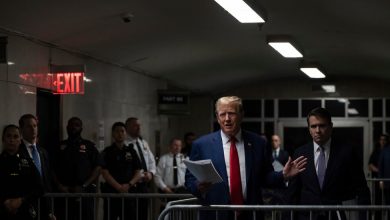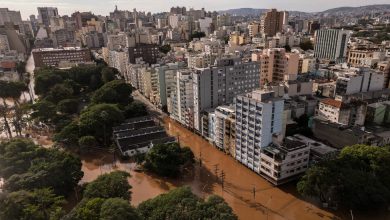Venezuela’s Oil Industry Is Broken. Now It’s Breaking the Environment.

Each morning, José Aguilera inspects the leaves of his banana and coffee plants on his farm in eastern Venezuela and calculates how much he can harvest — almost nothing.
Explosive gas flares from nearby oil wells spew an oily, flammable residue on the plants. The leaves burn, dry up and wither.
“There is no poison that can fight the oil,” he said. “When it falls, everything dries up.”
Venezuela’s oil industry, which helped transform the country’s fortunes, has been decimated by mismanagement and several years of U.S. sanctions imposed on the country’s authoritarian government, leaving behind a ravaged economy and a devastated environment.
The state-owned oil company has struggled to maintain minimal production for export to other countries, as well as domestic consumption. But to do so it has sacrificed basic maintenance and relied on increasingly shoddy equipment that has led to a growing environmental toll, environmental activists say.
Mr. Aguilera lives in El Tejero, a town nearly 300 miles east of Caracas, the capital, in an oil-rich region known for towns that never see the darkness of night. Gas flares from oil wells light up at all hours with a roaring thunder, their vibrations causing the walls of rickety houses to crack.
Many residents complain of having respiratory diseases like asthma, which scientists say can be aggravated by emissions from gas flares. Rain brings down an oily film that corrodes car engines, turns white clothes dark and stains notebooks that children carry to school.

José Aguilera Jr. on his father’s farm in eastern Venezuela. The farm is slowly dying because of gas flares from nearby oil wells that coat his banana and coffee plants with oil.
And yet, paradoxically, widespread fuel shortages in the country with the world’s largest proven oil reserves mean virtually no one in this region has cooking gas at home.
Soon after President Hugo Chávez rose to power in the 1990s with promises to use the country’s oil wealth to lift up the poor, he fired thousands of oil workers, including engineers and geologists, and replaced them with political supporters, took control of foreign-owned oil assets, and neglected safety and environmental standards.
Then, in 2019, the United States accused Mr. Chavez’s successor, President Nicolás Maduro, of election fraud and imposed economic sanctions, including a ban on Venezuelan oil imports, to try to force him from power.
The country’s economy collapsed, helping to fuel a mass exodus of Venezuelans who could not afford to feed their families even as Mr. Maduro has managed to maintain his repressive hold on power.
After grinding nearly to a halt, the oil sector has seen a modest rebound, in part because the Biden administration last year allowed Chevron, the last American company producing oil in Venezuela, to restart operations on a limited basis.
The national oil industry’s travails have been worsened by a corruption investigation into missing oil money that has so far led to dozens of arrests and the resignation of the country’s oil minister.
In eastern Venezuela, rusting refineries burn off methane gases that are part of the fossil fuel industry’s operations and are important drivers of global warming.
Even though Venezuela produces far less oil than it once did, it ranks third in the world in methane emissions per barrel of oil produced, according to the International Energy Agency.
Cabimas, a city about 400 miles northwest of Caracas on the shores of Lake Maracaibo, is another center of regional oil production. There, the state oil company, PDVSA, built hospitals and schools, set up summer camps and provided residents with Christmas toys.
Now oil seeps from deteriorating underwater pipelines in the lake, coating the shores and turning the water a neon green that can be seen from space. Broken pipes float on the surface, and oil drills are rusting and sinking into the water. Birds coated in oil struggle to fly.
The collapse of the oil industry has left Cabimas, once one of the richest communities in Venezuela, in extreme poverty.
Every day at 5 a.m., the three Méndez brothers — Miguel, 16, Diego, 14 and Manuel, 13 — untangle their fishing nets, clean them and row into the polluted waters of Lake Maracaibo, hoping to catch enough shrimp and fish to feed themselves, their parents and their younger sister.
They use gasoline to wash the oil from their skin.
Children play and bathe in the water, which smells of rotting sea life.
The boys’ father, Nelson Méndez, 58, was once a commercial fisherman, back when the lake was cleaner. He worries about getting sick from eating what his children catch, but he worries more about hunger.
He said he was hired by the state oil company about 10 years ago to help clean a fuel spill in the lake, but the work damaged his vision.
“Everything I worked for in life, I lost because of the oil,” Mr. Méndez said.
The poor maintenance of the fuel production machinery in Lake Maracaibo has led to an increase in oil spills, which have contaminated Cabimas and other communities along its shoreline, according to local organizations focusing on the issue.
The gas flares that burn across parts of Venezuela also point to the enfeeblement of the country’s fossil fuel industry: So much gas spews into the atmosphere because there is not enough functioning equipment to convert it into fuel, experts say.
Venezuela ranks among the worst countries in the world in terms of the volume of gas flares produced by its decrepit fuel operations, according to the World Bank.
In a 2021 report, the United Nations Commission on Human Rights expressed deep concern about the state of Venezuela’s oil industry.
“It is imperative that the government effectively implement its environmental regulatory framework on the oil industry,” the report said.
At a U.N. climate change summit last year, Mr. Maduro did not address the environmental damage resulting from his country’s hobbled oil industry.
Instead, he claimed that Venezuela was responsible for less than 0.4 percent of global greenhouse gas emissions and blamed wealthier countries for causing environmental harm. (Experts say that figure is accurate and note that the country’s emissions have decreased as its oil industry has cratered.)
“The Venezuelan people must pay the consequences of an imbalance caused by the world’s leading capitalist economies,” Mr. Maduro said in a speech at the summit.
A top government minister, Josué Alejandro Lorca, said in 2021 that oil spills were “not a big deal because, historically, all oil companies have had them.” He added that the government did not have the resources to address the problem.
The state oil company did not respond to requests for comment.
In Cabimas, David Colina, 46, a fisherman, wears oil-stained orange overalls with the distinctive emblem of the state oil company.
Thirty years ago, he said, he could catch more than 200 pounds of fish. Now he is lucky if he pulls up 25 pounds in his net before he exchanges them for flour or rice from his neighbors.
When the state oil company was functioning better, Mr. Colina said, he would be compensated if an oil spill affected his fishing business. But now, he added, “there is no government here anymore.”
After Chevron announced last year that it would resume some oil production in Venezuela, the state oil company hired divers to inspect the oil pipelines in Lake Maracaibo.
So far, according to interviews with three of those divers, leaking pipelines have yet to be repaired. The divers spoke anonymously because they said they could be punished for revealing internal company information. A Chevron representative declined to comment and referred questions to the Venezuelan state oil company.
Francisco Barrios, 62, who also lives in Cabimas, repaired boats used by the oil industry for more than 20 years, earning enough to feed his five children and pay for their education.
But he became disillusioned, he said, by the industry’s decline, the pollution it was causing, the increasingly shoddy infrastructure and a salary that could not keep up with a rising cost of living.
He said that one of his sons, who was a diver, was killed 12 years ago when an underwater pipe he was repairing exploded.
“I got tired of seeing the destruction,” he said while using gasoline to try to remove oil that had seeped into his yard.
Genevieve Glatsky contributed reporting from Bogotá, Colombia, and Ronny Rodríguez from El Tejero, Venezuela.




